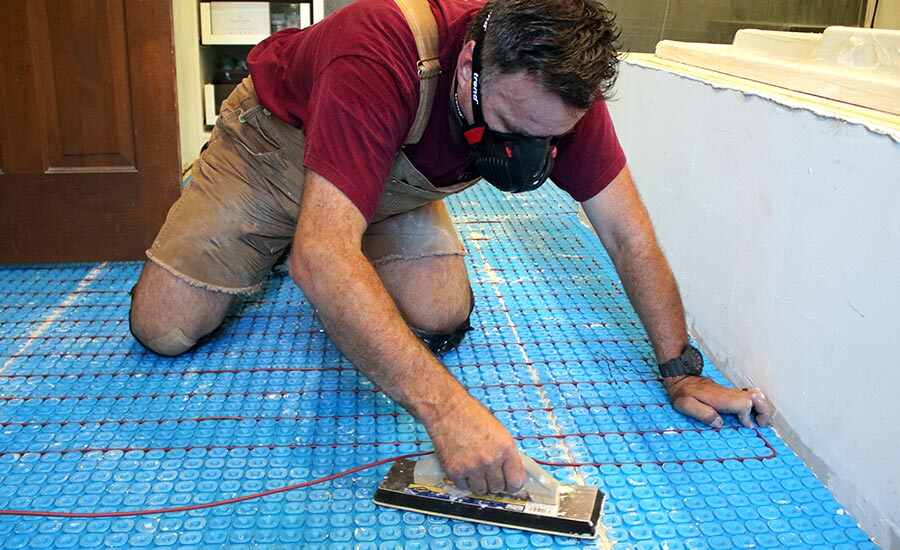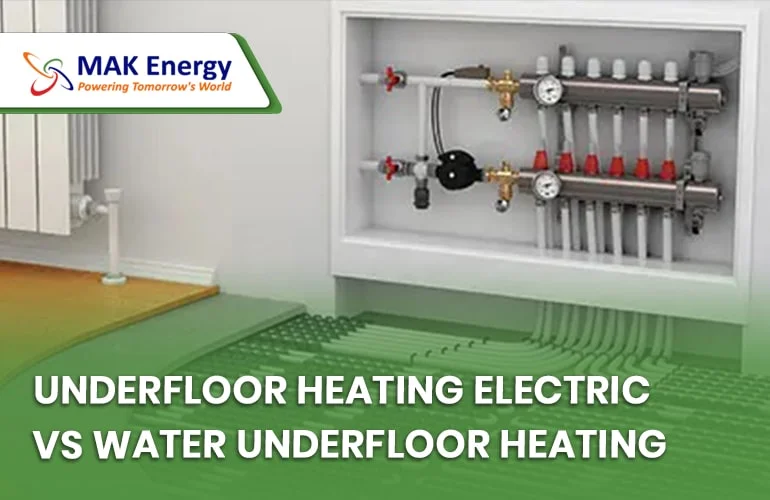LAST UPDATED: AUGUST 10TH, 2023 AT 11:42 AM
The underfloor heating system is known for being the most reliable and efficient way to heat homes, thanks to its eco-friendly and cost-effective nature. Additionally, it offers an aesthetically pleasing and safe heating option for individuals with asthma and allergies. However, many people may not be aware of the different types of underfloor heating systems, which include wet and electric systems. Both of these underfloor heating systems can be utilized in various applications and are impressive in heating spaces. Nonetheless, it’s crucial to understand the pros and cons of each system.
So, you’ve decided to get underfloor heating. But now, the question is: how do you choose between an electric and water floor heating system? Both systems are well-known for their efficiency, but which one is right for you? Let’s explore it.
When it comes to home heating, underfloor heating electric vs water underfloor heating, is a common debate. Both systems offer unique advantages, and choosing the right one depends on your needs and preferences. Here, we will discuss each and every aspect, covering underfloor heating electric vs water heating systems.
Comparing Underfloor Heating Electric Vs Water Underfloor Heating Systems
| Aspect | Electric Underfloor Heating System | Water Underfloor Heating System |
|---|---|---|
| Suitable projects | Best for single and renovation projects | Ideal for new build projects and larger spaces |
| How does it work? | By connecting heating wires or heating mats to the main electricity supply | By circulating hot water through a network of pipes to warm the floor of a room |
| Installation Cost | Lower installation cost than that of the wet system | Higher upfront cost |
| Running Cost | Higher running cost due to higher electricity rate | Lower running cost owing to 25% – 40% more efficiency |
Electric Vs Water Underfloor Heating System
Both electric and water underfloor heating systems are used to heat the space, but they differ from each other in their working, installation cost, running cost, efficiency, and more.
How Does an Underfloor Heating System Works?
Underfloor heating systems work differently based on their type. There are two main types of underfloor heating systems, both of which utilize radiant technology to gradually warm a room from the floor up. Let’s explore how each underfloor heating system works.
How Does a Water Underfloor Heating System Work?
Water underfloor heating is a highly effective system that utilizes hot water to warm the floor of a room. It operates by circulating hot water through a network of pipes that are discreetly embedded in the floor. These pipes, usually made of polyethylene or polypropylene, are installed with a spacing of 10-15 centimeters each, ensuring even heat distribution. The hot water is heated by a boiler, heat pump, or another heat source. To seamlessly connect the underfloor heating system to the heating source, like a heat pump or boiler, a manifold is required.
How Does an Electric Underfloor Heating System Work?
Electric floor heater come in further two different types: mat and heating cable-based system. Heating mats utilize slim electric heating wires already attached to a pre-sized mat, making it easy to roll out and affix to the subfloor. Conversely, heating cables work by using a series of cables that are embedded in the floor. The cables are connected to an electric current, which causes them to heat up. The heat from the cables is then transferred to the floor, which in turn warms the air in the room.

Electric underfloor heating systems are typically controlled by a thermostat, which allows you to set the desired temperature for the room. The thermostat will then turn the heating on and off as needed to maintain the desired temperature.
Electric Vs Water Underfloor Heating System Installation Cost
Comparison of underfloor heating electric vs water heating system involves different aspects, with the main focus being on their installation. Let’s explore the installation cost for each system.
What is The Installation Cost of Electric Underfloor Heating System?
The installation cost for an electric underfloor heating system is quite lower than that of a water underfloor heating system. On average, an electric underfloor heating system can cost you around £55-£80 per square meter for new buildings, and the cost for renovated buildings could go up to £65-£85 per square meter.

How Much Does a Water Underfloor Heating System Cost?
The wet or water underfloor heating system costs more than other types of underfloor heating systems. Therefore, the cost you will have to pay for a water underfloor heating system is approximately £110-£130 per square meter for newly built homes and £130-£175 per square meter for renovated properties. However, the overall cost can vary depending on the size to be heated.

Electric Vs Water Underfloor Heating System Running Cost
There is a significant difference in the running cost between the two underfloor heating systems. While the upfront cost of the water underfloor heating system is quite high, the electric underfloor heating system’s running cost is almost double that of the water system.
Electric Underfloor Heating System Running Cost
The running cost of an electric underfloor heating system is higher due to the higher electricity rate. When compared with the water heating system, the running cost of the electric underfloor heating system is three to four times costlier than the water system.
With an electricity rate of £0.24 per kWh, the running cost for heating a 10-square meter room will be approximately £390, while for a 30-square meter room, the running cost will be around £115.
Water Underfloor Heating System Running Cost
The water underfloor heating system is 25% more efficient when connected with a boiler, and its efficiency increases to 40% when connected with a heat pump. Compared to the electric underfloor heating system, the running cost for a 10-square meter room will be approximately £85, while for a 20-square meter room, it will be around £245.
Which System Is More Suitable For My Home?
For smaller houses or single-room spaces, the electric underfloor heating is best suited. In case of installing the underfloor heating system in an existing property, the electric underfloor heating system is most suitable due to its lower installation cost. The electric system can be installed in bathrooms or kitchens as it is a waterproof system.
On the other hand, for newly built properties and larger projects, the water underfloor heating system is a better option as it can be installed as part of the construction process. The running cost of the water underfloor heating is far less than that of the electric underfloor heating system.
Maintenance Costs of Each Underfloor Heating System
The electric underfloor heating system has almost zero maintenance cost because it doesn’t have any moving parts, and most of its components come with lifetime warranties.
Similarly, the water underfloor system also requires minimal maintenance. However, it needs an annual check of the boiler to ensure the comfort and efficiency the water underfloor heating system provides.
Summary
When it comes to the underfloor heating system, people often compare electric vs water underfloor heating systems to determine the best option for their needs. Both systems work to provide efficient heating, but they differ in their installation, running cost, and working criteria.
The electric underfloor heating system is known for its ease of installation and lower upfront costs. It involves connecting heating wires or heating mats to the main electricity supply. On the other hand, the water underfloor heating system requires a higher upfront cost as it involves circulating hot water through a network of pipes to warm the floor of a room. However, its running cost is significantly lower due to its 25% – 40% more efficiency.





